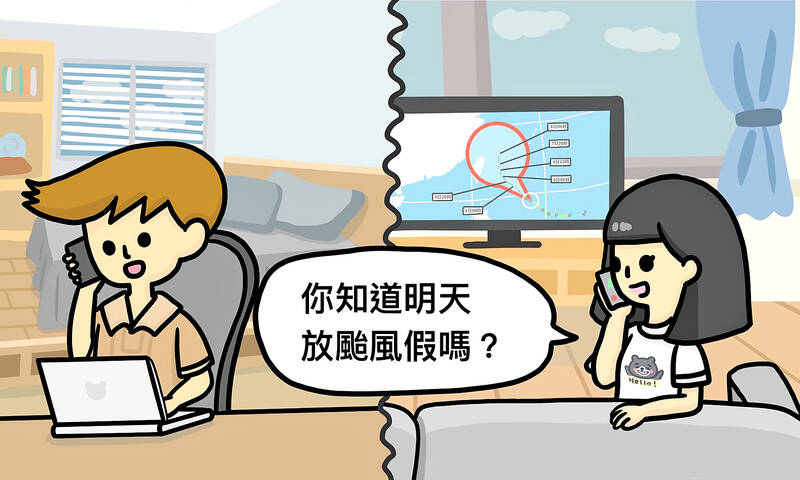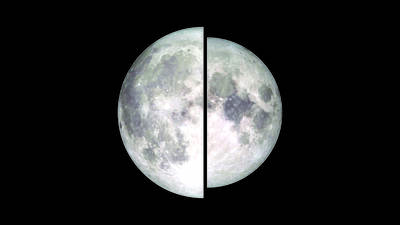對話 Dialogue
小實:馬克,你知道明天放颱風假嗎?
Xiǎoshí: Mǎkè, nǐ zhīdào míngtiān fàng táifēng jià ma?

馬克:不知道,你收到了學校的通知嗎?
Mǎkè: Bù zhīdào, nǐ shōudào le xuéxiào de tōngzhī ma?
小實:不是耶,是電視新聞播報的最新消息。
Xiǎoshí: Búshì ye, shì diànshì xīnwén bòbào de zuìxīn xiāoxí.
馬克:為什麼要放颱風假?我看現在的天氣還不錯啊!
Mǎkè: Wèishénme yào fàng táifēng jià? Wǒ kàn xiànzài de tiānqì hái búcuò a!
小實:肯定是氣象台預計明天的風雨不適合出門才放假的。
Xiǎoshí: Kěndìng shì qìxiàngtái yùjì míngtiān de fēngyǔ búshìhé chūmén cái fàngjià de.
馬克:這樣的話,我們應該準備什麼?
Mǎkè: Zhèyàng de huà, wǒmen yīnggāi zhǔnbèi shénme?
小實:我覺得今晚先準備一些食物,明天就別出門了。
Xiǎoshí: Wǒ juéde jīn wǎn xiān zhǔnbèi yìxiē shíwù, míngtiān jiù bié chūmén le.
馬克:好的,那我趕快先去超市買些東西!
Mǎkè: Hǎo de, nà wǒ gǎnkuài xiān qù chāoshì mǎi xiē dōngxi!
小實:好,注意安全喔!後天見。
Xiǎoshí: Hǎo, zhùyì ānquán ō! Hòutiān jiàn.
翻譯 Translation
Xiaoshi: Mark, did you know that a typhoon day off has been announced for tomorrow?
Mark: No, I didn’t. Did you receive the notification from the school?
Xiaoshi: No, it was the latest news on TV.
Mark: Why would they declare a day off? The weather seems fine right now!
Xiaoshi: I’m sure the meteorological department must have forecast that tomorrow’s weather is not suitable for going out.
Mark: In that case, what should we prepare?
Xiaoshi: I think we should prepare some food tonight and avoid going out tomorrow.
Mark: Alright, I’ll pop out to the supermarket to buy some things!
Xiaoshi: OK, stay safe! See you the day after tomorrow.
單字片語 Vocabulary
1. 颱風 (táifēng) typhoon
2. 通知 (tōngzhī) to notify
3. 新聞 (xīnwén) news
4. 播報 (bòbào) broadcast
5. 消息 (xiāoxí) news/ information
6. 肯定 (kěndìng) affirm, be sure
7. 預計 (yùjì) to forecast
8. 適合 (shìhé) to be suitable
9. 食物 (shíwù) food
10. 安全 (ānquán) safety
教材音檔 Audio Files
教材影片 Video Files:
https://www.instagram.com/celc.nou_tw/guide/_/17999106352646292/
實踐大學華語中心提供
By Shih Chien University Chinese Language Center: https://chineseusc.com/

Have you ever gazed at the night sky and felt as though the Moon loomed larger than usual? Your eyes were not deceiving you. The Moon’s apparent size can __1__ subtly depending on where it is in its orbit. On certain occasions, it reaches its fullest phase while at its closest point to Earth. When these two events __2__, scientists and the public refer to the spectacle as a “supermoon.” The Moon does not orbit our planet in a perfect circle. Instead, it travels along a more oval-shaped __3__, completing one full orbit every 27 days. Consequently, there are times when

US President Donald Trump has renewed his ambition to take control of Greenland for national security reasons and questioned whether Denmark has any legal right to the Arctic island. The debate has revived scrutiny of how Greenland became part of Denmark, its current self-rule and path to independence, and Washington’s military footprint. HOW DID DENMARK GET GREENLAND? Greenland was inhabited by Inuit peoples from Asia and North America intermittently from around 2,500 BC. Around 985 AD, Vikings led by Erik the Red settled in southern Greenland, farming and building churches. Around the same time, ancestors of today’s Inuit arrived, living as hunters

A: Aside from K-pop, what were the English chart-toppers? B: Billboard’s top three singles for 2025 were “Die with a Smile” by Lady Gaga/Bruno Mars, “Luther” by Kendrick Lamar/SZA and “A Bar Song (Tipsy)” by Shaboozey. Plus, pop diva Mariah Carey’s 1994 megahit “All I Want for Christmas Is You” won its 20th and 21st weeks at No. 1, becoming the longest-running No. 1 song in history. A: How about in Taiwan? The news says nine of the 10 most-streamed songs on Spotify Taiwan were Korean. B: Yup, and the top three were: “Winter Ahead” by BTS’ V and Park

AI-generated summaries are shaking up the media world. Tools like Google’s AI Overviews now provide users with direct answers above the search results, resulting in fewer people clicking on news links. For publishers who rely on that traffic to generate advertising revenue, this shift is hitting hard. The fallout is measurable. Many sites have seen a sharp drop in traffic since AI summary features rolled out. An analysis revealed that a news outlet that had once ranked first on Google lost up to 79% of its traffic when its link appeared beneath an AI-generated summary. Statistics also show that